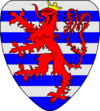Arlon
| Arlon | ||||||
|---|---|---|---|---|---|---|
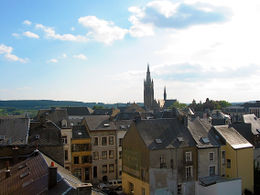 |
||||||
|
||||||
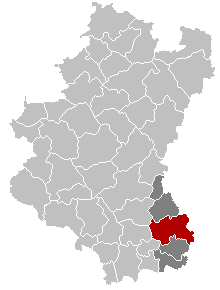 |
||||||
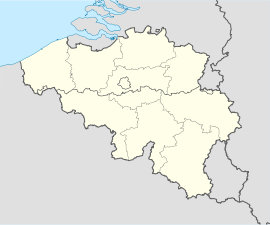 Arlon
Location in Belgium
|
||||||
| Sovereign state | ||||||
| Region | ||||||
| Community | ||||||
| Province | ||||||
| Arrondissement | Arlon | |||||
| Coordinates | ||||||
| Area | 118.64 km² | |||||
| Population – Males – Females – Density |
26,367 (2006-01-01) 49.74% 50.26% 222 inhab./km² |
|||||
| Unemployment rate | 10.60% (1 January 2006) | |||||
| Mean annual income | €14,500/pers. (2003) | |||||
| Mayor | Raymond Biren (cdH) | |||||
| Governing parties | cdH, PS | |||||
| Postal codes | 6700, 6704, 6706 | |||||
| Area codes | 063 | |||||
| Website | www.arlon.be | |||||
|
|||||||||||||||||||||||
Arlon (Luxembourgish: Arel; Dutch: Aarlen; Walloon: Årlon) is a Belgian municipality located in the Walloon province of Luxembourg, of which it is the capital. Despite the Luxembourgish majority population, the city was not included in the Grand Duchy of Luxembourg and an assimilation process to the French language continued undisturbed.
The municipality of Arlon includes the old communes of Autelbas (Luxembourgish: Nidderälter), Autelhaut, Barnich, Bonnert (Bunnert), Clairefontaine, Fouches, Frassem, Freylange, Guirsch (Giisch), Heckbous, Heinsch (Häschel), Sampont, Sesselich, Seymerich, Sterpenich, Toernich (Täernech), Udange, Viville, Waltzing, and Weyler.
Contents |
History
Roman and medieval times
Before the Roman conquests of Gaul, the territory of Arlon and a vast area to the southeast were settled by the Treveri, a tribe of mixed Celtic and Germanic origins. The local population adapted relatively easily to Roman culture. The number and quality of sculpted stones and monuments that have been unearthed in the area demonstrate that the vicus of Orolaunum quickly became a vibrant commercial and administrative centre of Roman civilization. The Germanic invasions of the 3rd century destroyed most of these early advances, despite the defensive walls that had been built on the Knipchen hill to protect the vicus.
During most of the Middle Ages, the population still used the earlier buildings such as the thermae. In 1060, Waleran I of Limburg, Count of Arlon, built a castle on the Knipchen hill. In the 13th century, the only feminine Cistercian abbeys known to date were built in Clairefontaine and Autelbas.
15th century until the French Revolution
The Duchy of Luxembourg itself, of which Arlon was dependent, became part of the Burgundian Netherlands under Philip the Good in 1441. After Charles V's abdication of his empire to his son Philip II of Spain in 1556, a troubled period started for the whole region as continuous wars opposed France, Spain, and the Southern Netherlands. In 1558, nearly half of the city, including its castle, was destroyed by the French troops of Francis, Duke of Guise. In the 17th century, Capuchin monks built a convent on the ruins of the castle and the French strengthened the defensive walls according to Vauban's designs. An accidental fire destroyed a large part of the city again in 1785.
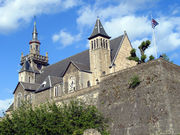
Modern times
On June 9, 1793, the French Revolutionary troops opposed the Austrians just outside Arlon. The French emerged victorious and occupied the city. They expelled the Capuchin monks and used their convent as a hospital. After the Battle of Waterloo, Arlon's history is entwined with that of Belgium.
Arlon was one of the first victims of the German invasion in 1914 as 121 inhabitants were executed on August 26 on the orders of Colonel Richard Karl von Tessmar. Its territory was again among the first to be invaded at the onset of World War II. During the second world war the mayor collaborated with the Germans. He was shot in 1946.
Arlon today
Being situated very close to the border with Grand Duchy of Luxembourg, Arlon has continued to expand with new residential areas and commercial development zones. Because of its proximity to the Grand Duchy of Luxembourg many are crossing the border to work there. One of the largest industrial employers is the Ferrero Rocher chocolate factory. Having the last station on the main Brussels—Luxembourg City railway line all International express trains make a stop in Arlon.
Sights

- Arlon is best known for holding one of the richest archæological museums in Belgium. It houses numerous examples of Roman sculpture and Merovingian funerary art.
- A fragment of the Gallo-Roman defensive wall that was built in the 3rd century still stands in Arlon.
- The Gaspar Museum is well-known for its furniture, paintings, ceramics, and religious art.
- The Saint-Donat church now stands on the Knipchen hill, where Waleran I of Limburg once built his castle and the Capuchin monks built their convent.
Folklore
- The carnival of Arlon takes place at mid-Lent. It includes the traditional handing of the keys of the city to the carnival prince and a colourful parade composed of various folkloric groups.
- The Maitrank (German: drink of May) is the city's most popular refreshment. It is made of white wine in which a local flower, the asperula odorata, has macerated. Some recipes also add cognac or substitute woodruff for the asperula. The Maitrank festivities take place in the city every fourth Sunday of May.
People born in Arlon
- Johann Kaspar Basselet von La Rosée, Bavarian general (1710–1795)
- Godefroid Kurth, historian (1847–1916)
- Benoît Lamy, film director (1945–2008)
- Ingrid Lempereur, swimmer (1969)
International relations
Twin towns — Sister cities
Arlon is twinned with:
 France: Saint-Dié-des-Vosges
France: Saint-Dié-des-Vosges Luxembourg: Diekirch
Luxembourg: Diekirch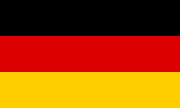 Germany: Bitburg
Germany: Bitburg United States: Sulphur, Louisiana
United States: Sulphur, Louisiana France: Hayange
France: Hayange Italy: Alba
Italy: Alba United Kingdom: Market Drayton
United Kingdom: Market Drayton
External links
- Official city web site (in French)
- Alternative site (in French)
- Official Maitrank web site (in French)
- Official Saint-Martin parish website of Arlon city
|
|||||||||||||||||||

